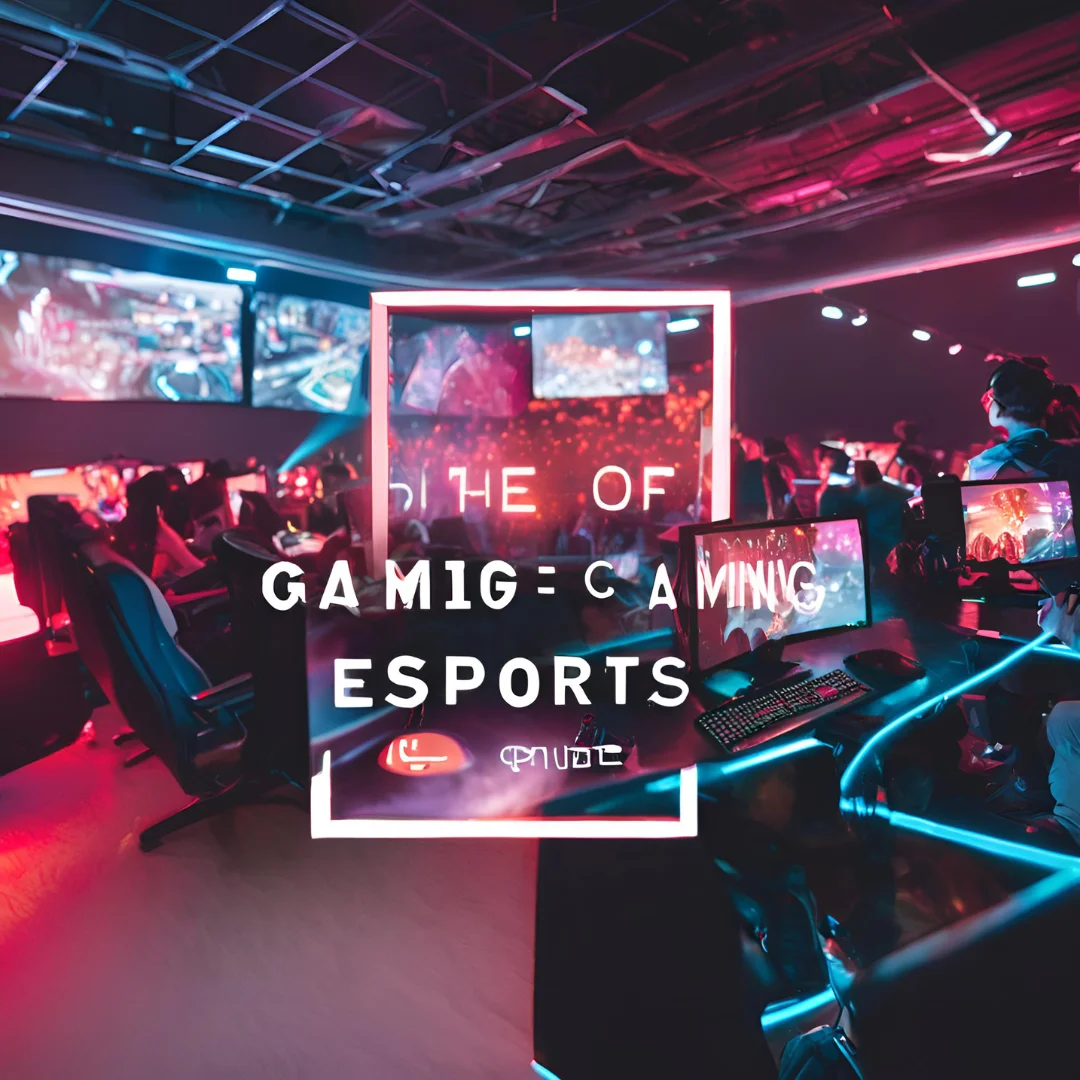Introduction
Over the past few decades, there has been an unheard-of rise in popularity in the gaming and esports industries. Millions of players and spectators worldwide are enthralled with what was formerly thought to be a specialized pastime. Gaming and esports have become mainstream entertainment, providing employment opportunities and building varied communities, thanks to technological developments, game accessibility, and the growth of online networks. This blog delves into the history, development, significance, and prospects of gaming and esports, illuminating the driving forces behind this sector's ascent to prominence in popular culture.
1. The Evolution of Gaming
1.1 Early Beginnings
The earliest consoles and basic computer games appeared in the 1950s and 60s, marking the beginning of gaming history. Plays such as "Pong," "Space Invaders," and "Pac-Man" captivated players' attention and established the gaming business. Even though the scale and graphics of these early games were frequently constrained, they ignited a cultural movement that would develop tremendously.
The inception of computer games can be attributed to scientists and engineers who investigated the possibilities of computers for leisure use. "Tennis for Two," the first video game, was created in 1958 by physicist William Higinbotham. This easy game was played on an oscilloscope screen and mimicked a tennis match. Afterwards, the commercial video game industry started when Atari released "Pong" in 1972. This table tennis simulation game became viral and contributed to the acceptance of video games as a legitimate kind of entertainment.
1.2 The Rise of Home Consoles
With the release of home systems like the Nintendo Entertainment System (NES), Sega Genesis, and PlayStation, the 1980s and 1990s saw a dramatic shift in the gaming industry. With the introduction of these systems, gaming became more widely available by moving into the living room. A common type of entertainment, video games started to gain traction as iconic titles like "Super Mario Bros.," "The Legend of Zelda," and "Sonic the Hedgehog" became cultural icons.
After the 1983 crash, the video game industry was greatly helped by the debut of the Nintendo Entertainment System (NES) in 1985. The NES set the bar for upcoming console generations with its inventive game design and endearing characters like Mario and Link. When the Sega Genesis was debuted in 1988, it had 16-bit graphics and offered a more sophisticated gaming experience, making it popular with older players. With its revolutionary usage of CD-ROMs, the PlayStation (released in 1994) transformed the gaming industry and made games more sophisticated and visually spectacular. The emergence of portable gaming consoles like the Game Boy during this time period also contributed to the growth of the gaming industry.
1.3 The Advent of Online Gaming
Online gaming took off in the late 1990s and early 2000s, thanks in part to the expansion of the internet. Games such as "Quake," "Counter-Strike," and "World of Warcraft" enabled users to interact and engage in competition with others around the globe. With the growth of online gaming communities and the players' participation in sanctioned competitions for rewards and recognition, the idea of esports started to take shape.
The way individuals interacted with games and with one other was changed by online gaming. An additional element of rivalry and excitement was introduced by the opportunity to play with friends and complete strangers from around the globe. One of the first games to popularize online multiplayer matches was "Quake," which was launched in 1996. Early internet gamers loved it for its fast-paced action and player-versus-player mode. "Counter-Strike," a 1999 modification of "Half-Life," gained prominence in professional gaming because to its tactical gameplay that relied on teamwork. With its vast online universe and rich narrative, "World of Warcraft," which debuted in 2004, became a cultural phenomenon that drew millions of players and popularized the MMORPG genre.
2. The Emergence of Esports
2.1 Defining Esports
Electronic sports, or esports for short, are organized competitive gaming events in which individuals or groups participate in video games. First-person shooters, real-time strategy games, combat games, and sports simulations are just a few of the genres that can be included in esports. "Esports" refers to a broad category of activities, ranging from amateur online competitions to professional leagues with substantial prize pools.
Esports has developed from tiny, regional competitions to enormous global occasions. Although there has always been a competitive element to gaming, the formalization of esports has brought new levels of structure and professionalism. Professional gamers, sometimes referred to as players, participate in competitions that are frequently shown on television or streamed online. These events are supported by big businesses and draw sizable audiences both in person and virtually. Like traditional sports teams, esports teams and organizations have emerged as a result of esports' popularity.
2.2 The Growth of Esports
The growth of esports has been meteoric, fueled by several key factors:
-
Technological Advancements: Upgrading gaming technology, internet access, and streaming services have simplified competition for players and viewing for spectators.
-
Professionalization: Teams and organizations in the esports industry have grown increasingly professional, and players now get paid, sponsored, and trained. More people are watching as a result of this professionalization, which has also increased competitiveness.
-
Streaming and Broadcasting: Fans can now watch live matches, replays, and video from their favorite players and teams thanks to platforms like Twitch, YouTube, and Facebook Gaming, which have completely changed the way that esports are consumed.
-
Global Reach: Major leagues and tournaments in esports are televised in a variety of languages and geographical areas, catering to a global audience. A varied and fervent fan following has resulted from this appeal on a global scale.
Technology development has been a major factor in the growth of esports. Players may now compete at the highest levels thanks to powerful gaming PCs and fast internet connections. Twitch and other streaming services have given gamers a place to show off their abilities and get fans. The growth of esports has also been aided by its professionalization. Like traditional sports teams, esports organizations and teams now employ management, coaches, and support personnel. Players may concentrate on their training and performance because they are frequently given contracts and paid salaries.
2.3 Popular Esports Titles and Leagues
Several games and leagues have become iconic in the esports landscape:
-
League of Legends (LoL): One of the most well-known esports games is League of Legends (LoL), created by Riot Games and renowned for its strategic gameplay and major international competitions like the League of Legends World Championship.
-
Dota 2: Dota 2 is a well-known game in the multiplayer online battle arena (MOBA) genre, renowned for its intricate gameplay and elevated skill ceiling. Dota 2's yearly championship, The International, offers some of the biggest esports prize pools.
-
Counter-Strike: Global Offensive (CS): One of the mainstays of the first-person shooter genre, Counter-Strike has a devoted esports ecosystem with ongoing leagues and competitions.
-
Fortnite: Thanks to competitions like the Fortnite World Cup, the popular battle royale mode, Fortnite has had a big influence on the esports industry.
-
Overwatch: The esports scene for Blizzard Entertainment's team-based shooter is quite active, with the Overwatch League being its main rival.
These games have drawn millions of viewers in addition to becoming well-liked among players. For instance, the League of Legends World Championship is one of the most watched esports competitions globally, with crowds that are comparable to those of major traditional sports events like the Super Bowl. The enormous prize pool of the Dota 2 championship event, known as The International, is funded entirely by the game's community. In 2019, almost 2 million people watched the $30 million prize pool Fortnite World Cup on streaming platforms. The Overwatch League features teams from all over the world and has implemented a franchise system based on cities, much like traditional sports leagues.
3. The Impact of Gaming and Esports
3.1 Economic Impact
Through game sales, in-game purchases, sponsorships, advertising, and merchandising, the gaming and esports businesses have grown to become significant economic drivers, bringing in billions of dollars annually. In addition to professional players and coaches, the growth of esports has opened up new employment paths for streamers, commentators, and content producers.
Beyond just the sales of games and gear, gaming and esports have a significant economic impact. Downloadable content (DLC) and cosmetic items are examples of in-game purchases that have grown to be a sizable source of income for game creators. Major corporations, including as tech firms, beverage brands, and hardware manufacturers, fund esports teams and organizations. These sponsorships contribute to the team's operating budget and player compensation. The rise in popularity of esports has also contributed to the growth of streaming services like Twitch and YouTube Gaming, which make money from subscriptions and adverts. Streamers and YouTubers are examples of content creators who have gained prominence in the gaming community and frequently have lucrative sponsorship agreements.
3.2 Cultural Influence
The influence of gaming on popular culture has spread to music, cinema, fashion, and even language. Esports competitions with a large viewership base, such as the League of Legends World Championship and The International, surpass traditional sports in terms of attendance. Games like "Minecraft," "Pokémon," and "The Legend of Zelda" have transcended the gaming industry to become cultural phenomenon, and gaming characters and brands have grown to become iconic.
There are many facets of daily life where gaming has a noticeable cultural impact. Fans are drawn to fashion and items with gaming-inspired designs, and gaming vocabulary and terminology have become commonplace. Characters from video games such as Mario, Pikachu, and Link are well-known worldwide, and gaming franchises have become iconic. The popularity of video game-based films and television series, such "Pokémon" and "Witcher," is another evidence of the influence of gaming on culture. Like regular sporting events, esports competitions frequently draw thousands of spectators and take place in enormous facilities. As esports have grown, devoted fan communities have also developed, with members following their preferred teams and players and participating in debates and analysis.
3.3 Social Impact
Due to its ability to provide a forum for social engagement and community development, gaming and esports have also had an impact on social dynamics. People can interact, cooperate, and compete in online games, which promotes communities and friendships. Nevertheless, the sector also has to deal with problems like mental health, harassment, and inclusion.
The effects of gaming on society are complex. People may now connect with others who have similar interests thanks to online multiplayer gaming and esports. As a result, friendships and online communities that are global in scope have emerged. These groups provide a feeling of community and friendship for many players and fans. But there are other difficulties facing the game industry, such as problems with inclusion and diversity. The dearth of representation of women and people of color in video games and the industry at large has drawn criticism. Furthermore, the gaming community has experienced problems with toxic conduct and harassment, especially directed at underprivileged groups. Another significant issue is mental health, with worries regarding how excessive gaming may affect mental health.
Conclusion
The growth of esports and gaming is evidence of the influence of community, creativity, and technology. With gaming's ongoing evolution and growth, there are more chances than ever for connection, competitiveness, and pleasure. The world of gaming and esports is exciting and full of possibilities, regardless matter whether you're a casual player, an ardent fan, or someone hoping to get into the business. Future trends in gaming and esports are certain to have a big impact on how our society, economy, and culture develop. The future of gaming and esports is bright and promising, with technology advancements, more accessibility, and growing public acceptance all contributing to this.




